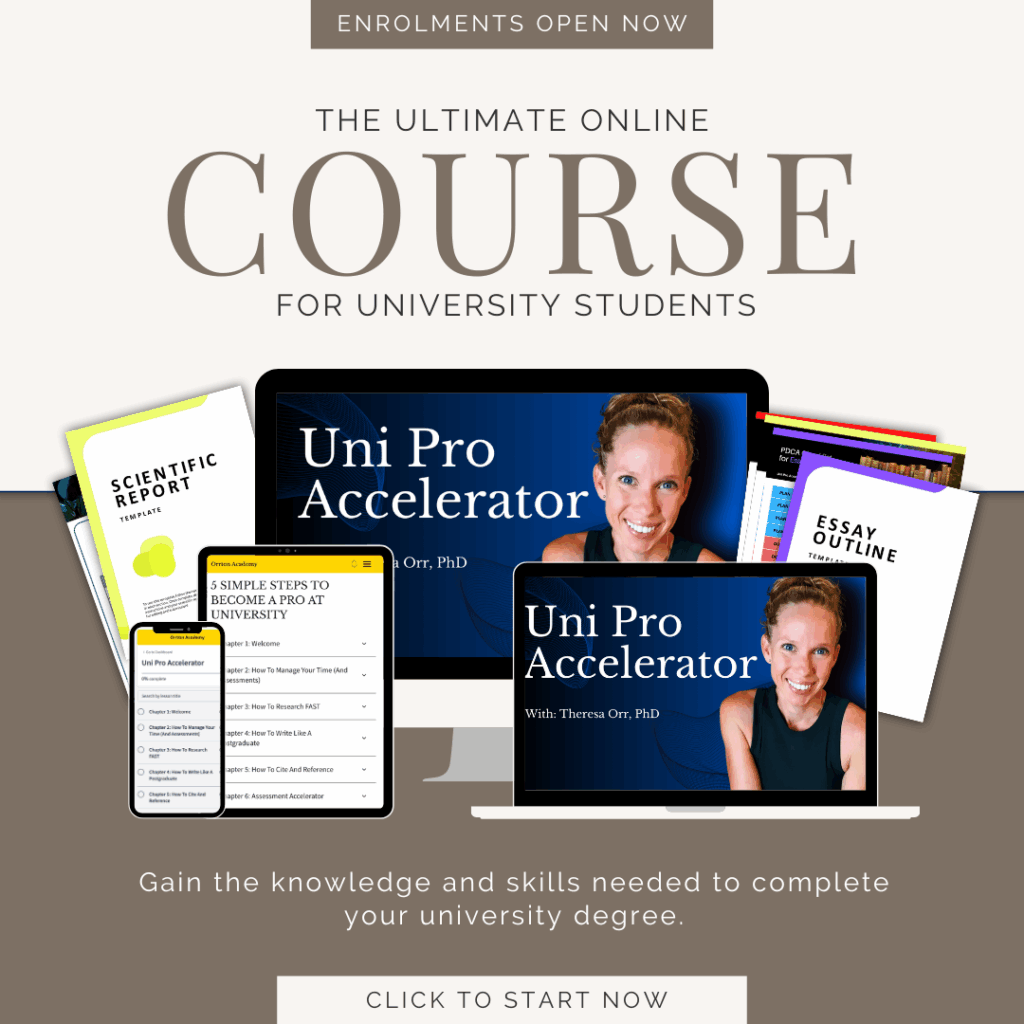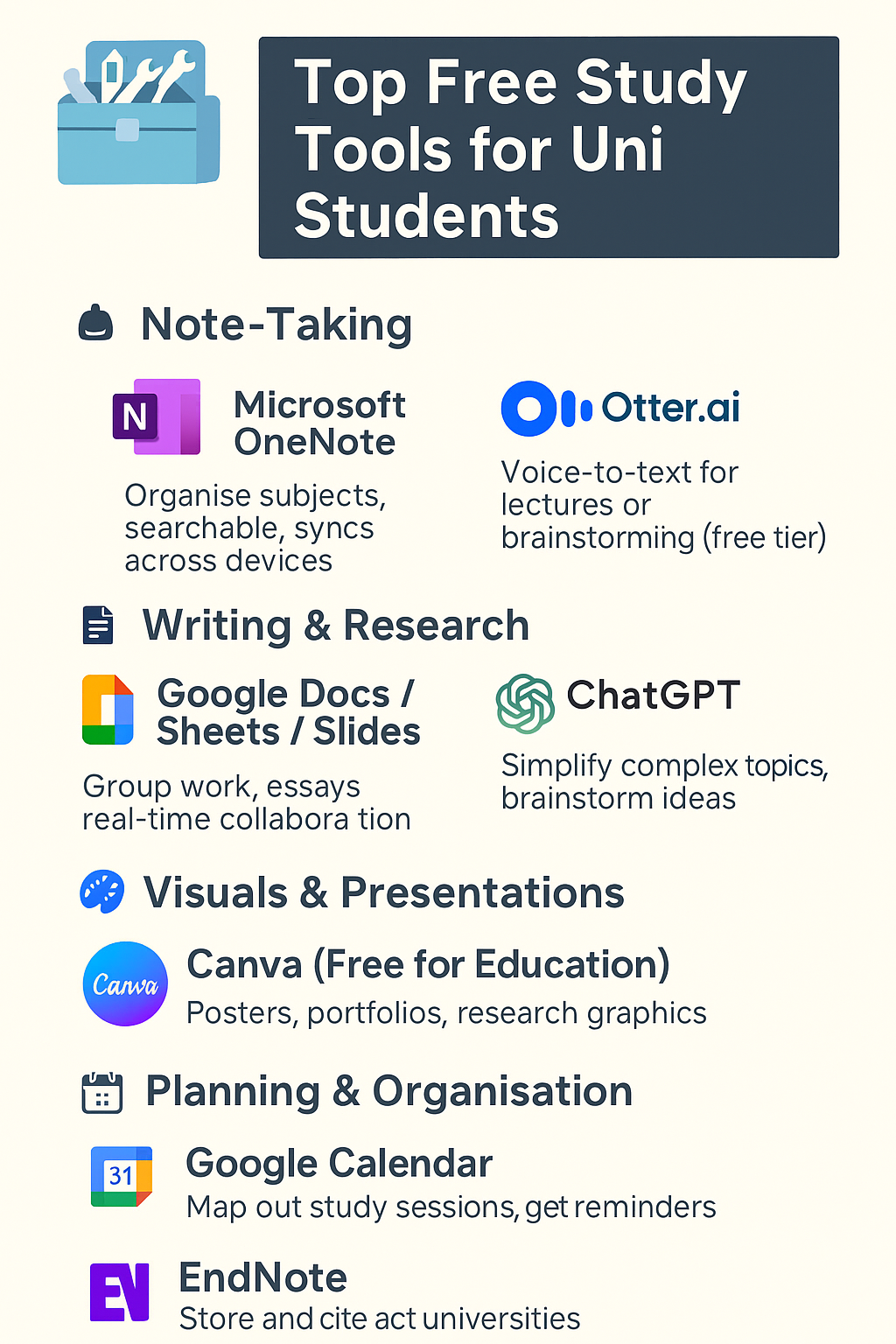The right apps can help you study smarter, stay organised, and write better assignments. The best free study tools for students include onenote, otter.ai (free version), ChatGPT, and Google Scholar – but it’s important to understand why they are better than some others you might have heard of.
Too many university students waste time using the wrong tools – or worse, none at all. Here are the top free study tools I recommend everyone should use.
Become the student you’ve always wanted to be
Study smarter, write better, and finish your degree with confidence
1. Microsoft OneNote
Best for: Taking lecture notes, organising by subject, syncing across devices
✅ Free with Office 365 (which students get for free all over the world through their university)
OneNote is my go-to for digital note-taking. You can create different notebooks for each subject, use tabs to split topics, and even embed images, audio, or PDFs. Unlike loose Word docs, your notes stay structured, searchable, and in one place. Perfect for both handwritten tablet notes or keyboard typing.
2. Otter.ai (Free Plan)
Best for: Transcribing lectures, interviews, or voice memos to text
🧠 Great for overcoming writer’s block or reviewing spoken ideas
Otter can turn your recorded lectures, tutorials, or even your own voice notes into editable text. This is especially helpful if you process ideas better by talking them out. You can also use it to transcribe parts of group discussions or academic interviews. Just note that the free plan comes with monthly limits, so use it strategically.
3. Google Scholar
Best for: Quickly finding peer-reviewed sources and research articles
Forget random blog posts—this is your go-to search engine for academic articles. If you’re writing a research-heavy paper, this should be your first stop. It also gives you quick citation previews (but always double-check formatting).
4. Google Drive (Docs, Sheets, Slides)
Best for: Group work, essays, spreadsheets, and cloud backups
Docs is ideal for essay drafting, Sheets for organising research or marks, and Slides for your group presentations. Everything is saved in the cloud, so there’s no risk of losing your work. And since it’s collaborative, group assignments just got a whole lot easier.

5. ChatGPT (Free Version)
Best for: Understanding complex topics, rewriting difficult texts, brainstorming ideas
This tool is incredibly helpful when you’re stuck. You can ask it to explain a concept “like you’re 12,” reword tricky texts, or help you brainstorm ideas. It’s not a replacement for research or writing, but it can seriously speed up the thinking part.
6. Canva (Free for Education)
Best for: Creating visual assignments like posters, infographics, or portfolios
Canva’s drag-and-drop interface is perfect for students who need to make something look polished but don’t have design experience. Their education plan is free and includes templates for everything from research posters to social media graphics.
7. Google Calendar
Best for: Planning your semester, blocking out study time, and setting assignment reminders
It’s not fancy, but it works. Use it to track due dates, exams, and class times. Create recurring blocks for study sessions so they actually happen. Sync across all your devices and get notifications before assessments are due.
8. EndNote (Check if your uni provides it for free)
Best for: Managing citations and references for long essays or theses
EndNote is robust referencing software that lets you store, organise, and cite academic sources. It’s especially helpful for large projects like literature reviews or theses. While it’s not technically free, many universities offer it at no cost through their library.
For exam prep you’ll need more than apps – but don’t worry – you can read about how to use the most effective study strategy for yourself.
Why I Recommend These Tools (and Not Others)

There are plenty of study tools out there, and you’ve probably seen students raving about apps like Forest, Notion, Trello, or Grammarly. I’ve tried most of them—and while they work for some people, they’re not what I recommend for most uni students.
- OneNote vs Notion:
Notion is popular, but it has a steeper learning curve and can be more of a distraction than a help. OneNote, on the other hand, is free with your student Office365 account, integrates seamlessly with other Microsoft tools, and is quick to set up for each subject. - EndNote vs Zotero:
Zotero is open-source, but I find EndNote more powerful and easier to use – especially if you’re writing long reports or theses. Plus, many universities offer EndNote for free through the library. - Why not Grammarly or Trello?
Grammarly’s free version catches basic grammar, but it’s no substitute for learning how to edit your own writing. If you’re already using Microsoft Word (which you likely are through your uni), its built-in Editor tool is seriously underrated. You can adjust the settings to flag things like passive voice, unclear phrasing, and even formality level – without needing a separate app. As for Trello, it’s great for teams, but most students don’t need that level of task tracking. A simple calendar (like Google) or notebook does the job better.
Ready to Succeed At University? 🎓
Starting university can feel overwhelming—but it doesn’t have to. Imagine having a step-by-step guide for managing your time, smashing your assessments, and graduating with results you’re proud of. That’s exactly what the Uni Pro Accelerator is here for. This course is designed to help you:
✅ Plan your degree like a pro, avoiding expensive mistakes that add years to your degree.
✅ Write better essays, reports, and literature reviews with less stress.
✅ Manage your time effectively, even during exam season.
✅ Build the skills you need to ace every assessment – from research to editing.
Here’s why it works: I went from being a high school dropout to graduating with the university medal, completing a PhD, and teaching at a university. I’ve been where you are, and I know what it takes to succeed.
🚀 Get Started Today
Enrolling in Uni Pro isn’t just about surviving university – it’s about thriving. Don’t leave your success to chance.